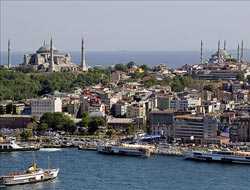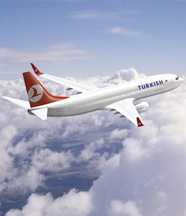 Global luxury real estate chain Sotheby’s announced the opening of its first office in Istanbul at a press meeting Tuesday.
Global luxury real estate chain Sotheby’s announced the opening of its first office in Istanbul at a press meeting Tuesday.
Turkey has great potential for demand in luxurious real estate, compared to the European market, Chief Executive of Sotheby’s International Realty Mike Good told the Hürriyet Daily News & Economic Review at the meeting.
Operating in 43 countries across the world through franchising and master offices, Sotheby’s opened its first branch in Turkey in the cosmopolitan district of Nişantaşı.
“Turkey is a very strategic location for us and we are confident that it will be a quality market,” Good said. “I expect a great boom in the Turkish market due to the country’s great population and keen interest in luxurious lifestyles.”
The number of Sotheby’s branches in Turkey is expected to rise to 10 over the next three years, said Emin Hitay, board chairman of Hitay Yatırım Holding – a Sotheby’s Turkish franchisee. “We aim to reach a business volume of $1 billion by the end of 2011,” he said.
Turkish consumers spent nearly $14 billion Turkish Liras this year and this amount is expected to rise, according to the chairman.
Nearly 15 percent of property projects in Istanbul consist of luxurious residences, he said. “We will provide private and confidential services for our customers.”
In the Istanbul real estate market, price-per-square-meter has risen from $5,000 to $25,000 in the last few years, Hitay told the Daily News. Istanbul would be the main focus of the company’s growth and new offices are set to be opened in the southern province of Antalya, as well as the southwestern province of Marmaris, in next few years, he said.
The real estate company also plans to provide services to Turkish customers who would like to buy or rent a property abroad, as well as foreigners in search of luxurious properties in Turkey. “Average per capita income [in Turkey] rose nearly threefold in the last eight years and consequently the purchasing power of Turks also increased rapidly, thanks to the positive climate following the global economic crisis,” the chairman said.
Foreign demand in local properties
Foreigners’ demand in Turkish properties has boomed in recent years, especially in Istanbul, since the city provides “a modern but also a traditional lifestyle in a unique environment,” he said. “The total volume of real estate purchased by foreigners living in Turkey had reached $566 million by the first quarter and $916 million in the second quarter of this year.”
The group expected this figure to rise, the chairman told the Daily News. “The law of reciprocity could be waived by the Turkish government regarding the sale of properties to foreigners.”
The Turkish Parliament has recently been working on a draft law to ease real estate purchases for foreigners.
“Foreign demand in old Istanbul – known as the main historical district of the city – is rising daily,” said Çiğdem Hitay, chairperson of Sotheby’s International Realty Turkey.
“Historic waterside mansions by the Bosphorus attract foreigners,” she said, adding that the cost of such residences vary between $6 million and $150 million, depending on the characteristics and conditions of the building and the view.
 Turkish and Spanish businesspeople gathered on Tuesday in a meeting in Istanbul with an eye to boost business and commercial ties.
Turkish and Spanish businesspeople gathered on Tuesday in a meeting in Istanbul with an eye to boost business and commercial ties.




